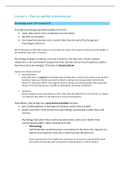Lecture 5 – The rise and fall of behaviorism
Psychology in the 20th century USA
Scientific psychology expanded rapidly in the USA:
• many laboratories were established at universities
• the APA was founded
• two important journals were created (American Journal of Psychology and
Psychological Review).
this US dominance in this field is due to its investments in science, the amount of research, and the quality of
the textbooks (e.g., James’ Principles).
Psychology changes to address concerns relevant to the American society, namely
adaptation to the environment (inspiration from Darwin) and practical usefulness (rather
than theoretical knowledge). This leads to functionalism.
Aspects of evolutionary theory:
• natural selection
In the USA, there is eugenics (social philosophy claiming that a society can be improved by selective
breeding). Some (e.g., Galton) were positive about it, aiming to encourage people with desirable
features to reproduce. Others were negative about it, aiming at preventing people with undesirable
features from reproducing (e.g., mentally ill, disabled) by promoting sterilization.
• adaptation
features depend on the environment as well, rather than only inherited. So, since the US is a country
of immigrants, they believe in the importance of the environment too.
Nonetheless, psychology has a precarious position, because:
• part of philosophical or theological institutes, rather than scientific
• people associate it with mesmerism, phrenology, spiritualism (rather than with
science)
Psychology has a hard time convincing universities, and even a harder time
convincing the public, which associated it with:
o Phrenology
Gall thinks that mental functions are localized in the brain; the capacity of a
function corresponds to the size of the brain part devoted to it.
Cranioscopy predicts the strengths and weaknesses of a person by measuring their skull.
Personality assessments made on the basis of scalp analysis (i.e., look at bumps).
, o Mesmerism
Mesmer thinks that patients can be cured by restoring their ‘animal
magnetism’.
o Spiritualism
belief that the spirits of the dead can be contacted by mediums. Especially
popular after the Civil War, which claimed many lives.
This pressures psychology to enhance its scientific status.
The scientificity of psychology
James and Titchener have a soft conception of psychology: the dominant methodology is
introspection. The fact that psychology does not qualify as a hard science is problematic.
As a soft science, psychology is vague (concerned with the mind and its experiences), it
wants to become HARD. Many non-scientific things today are included within psychology,
making it a vague science (i.e., phrenology, mesmerism, spiritualism).
Their pseudoscientific claims do not replicate, leading some to start questioning
pseudoscience. In this context, positivism (‘science is the motor of progress’) helps out,
arguing that objectivity must be guaranteed. This in turn opposes introspection, which is
largely subjective.
In the 20th century, Einstein’s relativity theory turns the world upside down. His
reasoning is rooted in the question of ‘how do we establish through measurement that two
events are simultaneous?’. He proves that the Newtonian intuition of absolute time is
wrong. Einstein is inspired by Galileo’s relativity of motion.
As far as psychology is concerned, this brings Bridgman to come up with operationalism
(attaching all concepts to measurement procedures). However, operations cannot be
synonymous to concepts, since a concept (e.g., length) can be measured by multiple
procedures. Operationalization is a way to define the vague concepts of psychology (e.g.,
hunger in terms of time passed since last meal). See More Later….




